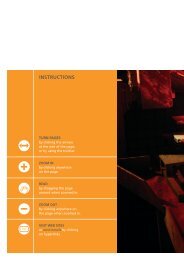MAGAZINE - Realview
MAGAZINE - Realview
MAGAZINE - Realview
Create successful ePaper yourself
Turn your PDF publications into a flip-book with our unique Google optimized e-Paper software.
NEWS<br />
IN BRIEF<br />
NEW YORK: Despite poor results, insurance companies continued<br />
to compete vigorously for business in the second quarter,<br />
according to a new Risk and Insurance Management Society<br />
(RIMS) Benchmark Survey.<br />
General liability and workers’ compensation policies both<br />
posted average decreases in renewal premiums. Directors and<br />
officers liability (D&O) policies renewed at higher premiums on<br />
average, but the increase was due to financial sector companies,<br />
a segment that has been bloodied by the sub-prime mortgage<br />
meltdown and credit crisis.<br />
“Insurance capacity is disappearing at a startling rate, but the<br />
market, nonetheless, remains competitive,” said Advisen executive<br />
vice president and editor-in-chief of the report Dave Bradford. “As a<br />
result of the recession the demand for insurance capacity has also<br />
decreased, which has kept pressure on rates. Companies are<br />
downsizing, which means there is simply less to insure.”<br />
RIMS board of directors member Daniel Kugler concurred: “If the<br />
gloom of the global recession has a silver lining for risk managers, it<br />
is the competitive insurance market.”<br />
HYDERABAD, India: Software solutions provider SoftPro Systems<br />
has acquired 100 per cent of Cura Software Solutions.<br />
Established in 1994, SoftPro provides a wide range of solutions<br />
to the banking, finance, insurance, retail, telecom and manufacturing<br />
industries. Cura has its HQ in South Africa and was<br />
established in 2002. It offers companies around the world solutions<br />
aimed at improving governance, risk management, compliance<br />
(GRC) and performance management. It has 100 staff<br />
members in four countries, distributors in another 10, serves more<br />
than 200 customers and has achieved year-on-year revenue<br />
growth for the past four years.<br />
“It has taken us months of searching to find a partner that will<br />
help us grow our business internationally and inject the funding<br />
we require to achieve our long-term goals,” said Cura chairman<br />
David Frankel. “After considering approaches by competitors,<br />
acquirers and venture capitalists, we settled on SoftPro as their<br />
culture, ethics and strategic approach was in line with all our<br />
stakeholders’ interests.”<br />
SoftPro’s intent is to grow Cura into a company with more<br />
than $US150 million ($185 million) in revenue by 2014. Cura will<br />
retain its brand.<br />
LOS ANGELES: Bank of Tokyo Mitsubishi’s senior vice president<br />
of corporate data security, Emil D’Angelo, has been elected<br />
international president of ISACA – a global association serving<br />
86,000 IT governance, assurance and security professionals in<br />
160 countries – at its 37th annual International Conference in<br />
Los Angeles.<br />
D’Angelo also assumes the role of international president of the<br />
IT Governance Institute (ITGI), the non-profit, independent research<br />
affiliate established by ISACA in 1998 to help enterprise leaders<br />
ensure that IT supports the enterprise’s mission and goals.<br />
A member of ISACA for more than 30 years, D’Angelo has<br />
served on its Strategic Advisory Council and Governance Advisory<br />
Council and chaired the Security Management Committee. He is a<br />
recipient of ISACA’s Eugene Frank Award, awarded by the board of<br />
directors for outstanding contributions to ISACA or ITGI.<br />
Local firms upbeat on growth prospects<br />
While most companies around the globe remain intent on simply surviving the economic<br />
crisis, it seems their Australian counterparts are now gearing for growth – but they are not out<br />
of the woods yet.<br />
SYDNEY: Australia may well prove to be the “lucky<br />
country” for businesses emerging from the global<br />
financial crisis. According to the results of a new<br />
survey of 380 C-suite and board level executives<br />
from corporate Australia, compared to results of<br />
a similar world study, local businesses have been<br />
more confident and more aggressive in responding<br />
to the crisis and the changing business landscape<br />
than global players.<br />
The study, The lucky country looks forward –<br />
Opportunities in adversity for Australian business,<br />
conducted by Ernst & Young, appears to confirm<br />
that the impact on Australian businesses has not<br />
been as severe, with 76 per cent of respondents<br />
believing the effect on profitability of the current<br />
crisis will be temporary.<br />
“Australian businesses are cautiously optimistic<br />
for the 2010 financial year, with far more proactive<br />
plans over the next 12 months,” said E&Y corporate<br />
accounts leader Patrick Winter. “Access to<br />
capital is still difficult, particularly for small and<br />
mid-cap companies, however organisations have<br />
implemented initiatives to reduce costs and manage<br />
cash and working capital more effectively.<br />
“Many have introduced flexible working practices<br />
to help them avoid substantial headcount reduction,<br />
with a view to retaining the talent they will<br />
need when the market recovers.”<br />
He said that while global respondents were primarily<br />
concerned with surviving the downturn,<br />
Australian businesses are focused on growth.<br />
In the next 12 months, 78 per cent of Australian<br />
businesses placed the greatest importance<br />
on improving the performance of current<br />
assets, 70 per cent are restructuring their business<br />
to meet new conditions, and 66 per cent<br />
are prioritising taking advantage of the situation<br />
to pursue new market opportunities. However,<br />
the question now is whether they have done<br />
enough to prepare for growth and capitalise on<br />
the upswing when conditions improve.<br />
While 70 per cent are restructuring their business,<br />
this is primarily centred on cost-cutting rather<br />
than fundamentally realigning business structures<br />
and operations.<br />
“The limited availability of debt has led to a<br />
gap in buyer/vendor expectations and a stagnant<br />
M&A market,” Winter said. “These factors<br />
are inhibiting the ability of companies to truly<br />
restructure by divesting non-core businesses,<br />
products or divisions.”<br />
While 53 per cent of respondents saw access<br />
to capital deteriorate over the past six months, 34<br />
per cent of those with $10 billion or more annual<br />
revenue reported improved access to capital in the<br />
same period, reflected in the record capital raisings<br />
dominated by the larger ASX-listed companies.<br />
“Australian businesses<br />
are cautiously optimistic<br />
for the 2010 financial<br />
year, with far more<br />
proactive plans over the<br />
next 12 months”<br />
“Many of our discussions with clients in recent<br />
months have focused on working capital and liquidity,<br />
as the pressure on management has intensified,’<br />
Winter revealed. “Our survey respondents<br />
agree – only 15 per cent say that cash is not an<br />
issue for their business.”<br />
The study shows Australian businesses have<br />
been more proactive than global respondents<br />
around debt finance, including reviewing, monitoring<br />
and renegotiating debt covenants and considering<br />
alternative sources of liquidity. However,<br />
they have been slightly less proactive in building<br />
working capital measures into management performance<br />
objectives and having an emergency<br />
plan for cash release.<br />
10 RISK August 2009

















